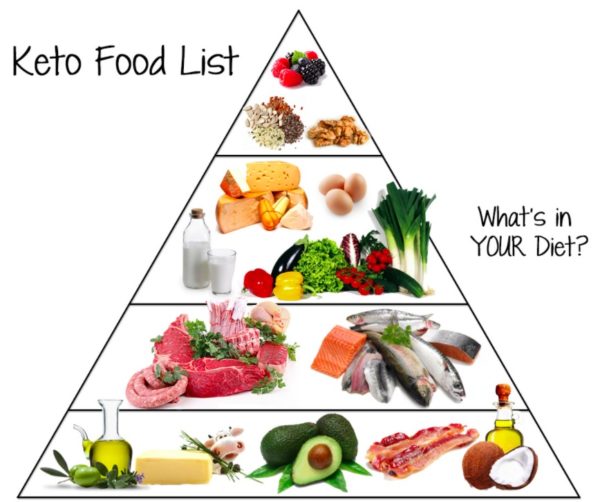Definition of Ketosis
Ketosis is a natural state for the body, when it primarily generates energy by fat. This state appears normally during fasting, or when applying to a low-carb, also called a ketogenic diet.
The word “keto” comes from the term “ketones” which are small fuel molecules being produced by the body during a state of ketosis. Ketones is an alternative fuel source when glucose is in short supply.
Ketones get produced from fat in the liver by eating very few carbs, natural fats and only moderate amounts of protein. The body, including the brain (!) consumes those ketones as fuel.
Optimizing Fat Burning
Living a ketogenic or low-carb lifestyle you are reducing insulin, increasing mobilization of stored body fat, and decreasing appetite. You start burning your own fat stores, which of course supports weight loss.
Decreasing appetite may be the most important benefit. The overriding drive to eat more food is the biggest impediment to weight loss, and it’s the reason why most diets fail. When people attempt to eat less food despite wanting more, they fight against their own physiology. Few win that battle.
Some Benefits of a Ketogenic or Low-Carb Lifestyle
- Weight loss
- Improved physical endurance
- Mental clarity
- Reverse Type 2 Diabetes
- Control epilepsy
- Improve acne
- Reverse polycystic ovary syndrome (PCOS)
- Fewer migranes
- Can even support treatment of brain cancer
- etc.
How to get into Nutritional Ketosis
To get into nutritional ketosis you need low levels of the fat-storing hormone insulin. The most important way to do that is to substantially reduce carbohydrates (only vegetables and salads and eventually some berries).
Another way to bring you in a state of nutritional ketosis is by adding intermitting fasting.
How do i know that i am in Ketosis
It can be measured:
Urine (Ketone called Acetoacetate):
Urine strips (Diastix/Bayer) is the most simple and cheap way to measure ketosis. It is the first option for most beginners. You dip the stick in your urine, and 15 seconds later the color change will tell you the presence of ketones. The presence of this in your urine indicates that you’re been in ketosis during the hours before testing. Bear in mind that this kind of test does not show precise ketone levels, but it is a good start. After you are keto-adapted the test might show no ketones anymore, because your body starts reabsorbing ketones from your urine.2.
Breath (Ketone: Acetone)
Breath ketone analyzer (Ketonix) is a a simple way to measure ketones in your breath. At around $150 they are more expensive than urine strips upfront. But they are cheaper than blood-ketone meters in the long run, as they are reusable any number of times.
These analyzers do not give you a precise ketone level, but rather a color code for the general level. Research shows that there is decent correlation with blood ketones in most situations.
Blood (Ketone: beta-hydroxybyturate (BHB)
Blood-ketone meters show an exact and current level of ketones in your blood. They are currently the gold standard and the most exact way to measure your ketosis level. The major disadvantage, however, is that it is expensive and invasive
Figuring without measuring
The positive symptoms:
- Better Jeans fit
- Reduced hunger
- Increased energy level
The less positive symptoms:
- Dry mouth
- Increased thirst
- Increased urination
- Keto breath
How to achieve Ketosis
There are many things that increase your level of ketosis. Most importantly:
- Restrict carbohydrates to 20-50 grams per day (depending on your glucose tolerance and how insulin sensitive you are)
- Consume moderately protein: max 1 gram of protein per day per ideal body weight (an athlete might need more). The most common mistake that stops people from reaching optimal ketosis is too much protein.
- Eat enough natural fats to feel satisfied
- Avoid snacking when not hungry. Unnecessary snacking slows weight loss
- If necessary you can apply intermitting fasting, like 16:8. This is very effective at boosting ketone levels, as well as accelerating weight loss and type 2 diabetes reversal.
- Add physical activity: adding any kind of physical activity while on low carb can increase ketone levels moderately. It can also help speed up weight loss and diabetes type 2 reversal slightly.
- Optionally you can supplement with MCT oil (e.g. Bulletproof Coffee)
Conclusion
Living a keto-adapted lifestyle allows us to do burn more fat for fuel. Since even the leanest among us carry tens of thousands of calories of body fat, our energy stores become virtually limitless on a ketogenic diet.
Assume your are 60 kg and measure 30% body fat. That means you are carrying around 18k of fat. 1 gram of fat = 9 kcal. Yes, you are right, you are carrying 18 kg fat aroung, which concretely speaking means 162’000 kcal.
Tons of energy to be burnt.
 Keep it up!
Keep it up!
Ihr Youdowell Team
Disclaimer:
This information does not provide medical advice, professional diagnosis, treatment or services to you or to any other individual. We solely provide suggestions for you and your doctor to research and provide general information for educational purposes only. The information provided is not a substitute for medical or professional care, and you should not use the information in place of a visit, call consultation or the advice of your physician or other healthcare provider. Youdowell AG is not liable or responsible for any advice, course of treatment, diagnosis or any other information, services or product you obtain through this site.
References:
- “The Art & Science of Low Carbohydrate Living”, by MD, PhD Stephen D. Phinney and RD, PhD Jeff Volek
- “The New Atkins for a New You” by Dr. Eric C. Westman and MD, PhD Stephen D. Phinney
-
Very-low-carbohydrate ketogenic diet v. low-fat diet for long-term weight loss: a meta-analysis of randomised controlled trials / https://www.cambridge.org/core/journals/british-journal-of-nutrition/article/verylowcarbohydrate-ketogenic-diet-v-lowfat-diet-for-longterm-weight-loss-a-metaanalysis-of-randomised-controlled-trials/6FD9F975BAFF1D46F84C8BA9CE860783
